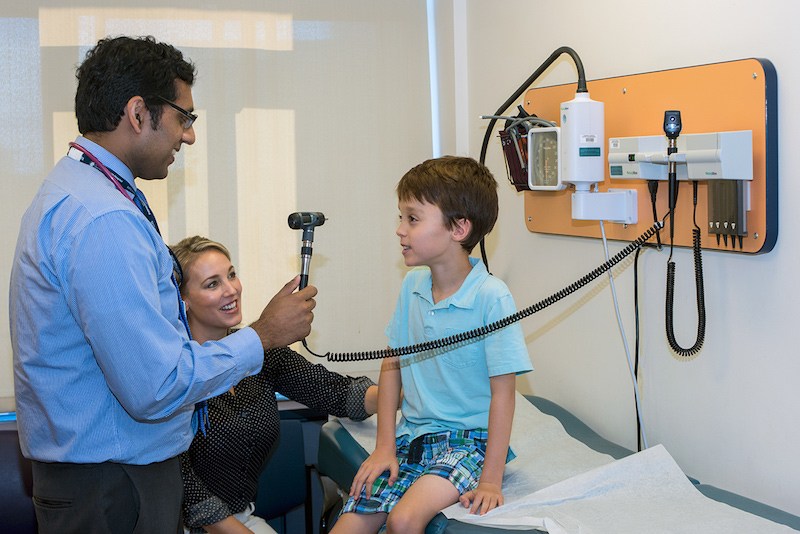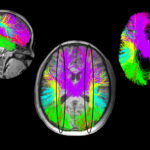Finally in the game: Patient in drug trial for PTEN mutation seems to benefit

From the time of Preston Hall’s birth at 30 weeks, his parents navigated multiple diagnoses, surgeries and sometimes life-threatening medical issues. At 11 months, Preston underwent skull revision surgery for trigonocephaly (a fusion of the skull bones causing a triangular-shaped forehead). After surgery, his doctors discovered serious airway and gastrointestinal issues that led to his failure to thrive. Preston eventually bounced back, but the underlying cause of his complex medical problems remained a mystery. All the while, his fraternal twin Luke overcame more typical preemie issues by age 3.
“At one point Preston had 20 different diagnoses,” his mother, Jennifer Hall, says. “It wasn’t until he was about 4 years old that we started to think his delays were not due to prematurity alone.”
Closing in on a diagnosis
At 6 years old, Preston had whole exome sequencing, ordered by his doctors in Texas. The test uncovered a mutation in the PTEN gene, which is responsible for a spectrum of conditions known collectively as PTEN hamartoma tumor syndrome (PHTS). It includes Cowden syndrome, Bannayan-Riley-Ruvalcaba syndrome (BRRS), PTEN-related Proteus syndrome and Proteus-like syndrome. PHTS can cause benign tumors called hamartomas throughout the skin, gastrointestinal tract or vasculature, as well as neurodevelopmental issues such as autism and cancer.

Preston, now 10 years old, has many of the symptoms of PHTS, including macrocephaly (an enlarged head), gastrointestinal polyps, airway issues and thyroid nodules. He has difficulties with communication and social engagement with peers. Twice a year, he and his family make the long trip from Dallas to Boston Children’s Hospital, where the Complex Care Service and the PTEN clinic coordinate Preston’s appointments and communication with as many as seven specialists. Regular cancer screenings are an important part of his care.
“It was important for us to find an experienced and confident team for Preston,” says Jennifer. “This is particularly hard for a rare disease like PHTS.”
“We regularly see patients with PHTS,” says Siddharth Srivastava, MD, an attending neurologist in Boston Children’s PTEN clinic. “Although the disease is rare, we are very comfortable treating it.”
Hope in a pill
In the spring of 2017, a Boston Children’s research coordinator contacted Preston’s parents about a first-of-its-kind clinical trial for PHTS in adolescents ages 6 to 21. The phase I/II randomized, double-blind trial is testing a drug called everolimus. The primary endpoints are safety and improved neurocognition.
A promising cancer treatment, everolimus inhibits the so-called mTOR pathway, which drives myriad cellular processes related to tumorigenesis, including adhesion, growth, migration and blood-vessel growth. (PTEN, a tumor suppressor gene, encodes an enzyme that also acts on the mTOR pathway.)
This was the first true intervention for PHTS we’d encountered. It wasn’t just managing his medical issues.
The original mTOR inhibitor, rapamycin, also known as sirolimus, was first approved by the FDA to prevent organ rejection of transplanted organs. Everolimus, derived from rapamycin, stops the overgrowth of cancer cells, and has been approved by the FDA to treat kidney and breast tumors and other cancers since 2009.
The mTOR pathway’s involvement in a host of diseases has made it a likely target for drug development. Mustafa Sahin, MD, PhD, director of the Translational Neuroscience Center at Boston Children’s, has been exploring the pathway’s role in central nervous system circuitry by studying PHTS and other genetic syndromes causing autism spectrum disorder, such as tuberous sclerosis and Phelan-McDermid syndrome.
“mTOR inhibitors have improved neurological symptoms in animal models of PHTS, giving hope that they may also work in individuals with PHTS,” says Sahin, who is leading the new clinical trial. “They have already been shown to be effective in similar genetic diseases such as tuberous sclerosis.”
A chance worth taking
After speaking to Sahin and understanding the rationale of the trial, Preston’s parents decided to go forward. “This was the first true intervention for PHTS we’d encountered,” says Jennifer. “It wasn’t just managing his medical issues. We were open to see seeing if it would work.”
Preston was the first Boston Children’s patient enrolled in the trial, which required monthly check-ins in Boston, but he didn’t mind. “He really bonded with the research coordinators,” says Jennifer.
Neither Preston’s parents nor Sahin will know for sure whether he was receiving everolimus or placebo until the trial is over. But after a month, the Halls suspected that he might be on the drug. His sentence structure was more advanced and his gross motor skills were improved. After six weeks, Preston showed interest in baseball, venturing outside on his own, throwing the ball up in the air and making contact with the bat, all of which were new for him.

But the real improvement came three months into the trial. With newfound coordination and initiative, Preston started playing basketball. This activity was the bridge he needed to become more involved with his peers. He was no longer playing by himself at recess.
“This was the biggest impact on his life,” says Jennifer. “Preston made his first friend this year because he could play basketball.”
Ready for the next adventure
Even having missed many days for the trial, Preston had a better year in school. His physical therapist noticed improvements in his coordination and strength. His mother shared these results at the PTEN Hamartoma Tumor Syndrome Foundation’s annual conference, where other PTEN families on the trial echoed her experience.
Preston has been off the drug since February 2018, but his parents haven’t noticed any decline in his cognition or gross motor skills.
“Next year, we’re moving into intermediate school,” says Jennifer. “Preston is gaining the skills to better advocate for himself, which is really reassuring.”
Related Posts :
-

Parsing the promise of inosine for neurogenic bladder
Spinal cord damage — whether from traumatic injury or conditions such as spina bifida — can have a profound impact on bladder ...
-

Thanks to Carter and his family, people are talking about spastic paraplegia
Nine-year-old Carter may be the most devoted — and popular — sports fan in his Connecticut town. “He loves all sports,” ...
-

Unveiling the hidden impact of moyamoya disease: Brain injury without symptoms
Moyamoya disease — a rare, progressive condition that narrows the brain’s blood vessels — leads to an increased risk of stroke ...
-

Forecasting the future for childhood cancer survivors
Children are much more likely to survive cancer today than 50 years ago. Unfortunately, as adults, many of them develop cardiovascular ...





